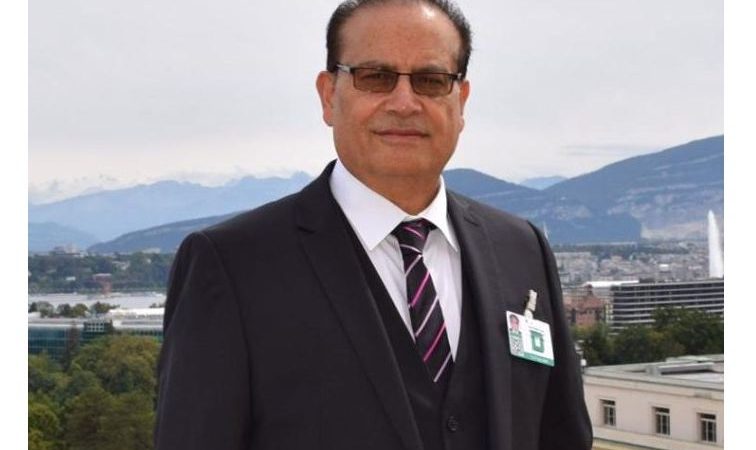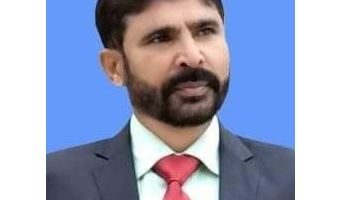Trumpet of Elections sans PTI..

Qamar Bashir
The leadership of major political parties seems acutely aware of the challenges surrounding elections, recognizing the potential futility given legitimacy and credibility crises, along with the looming specters of political instability and economic hardship if PTI is not given a free hand to contest the upcoming elections.
This realization has led key figures, such as Nawaz Sharif, Asif Zardari, and notably, Moulana Fazal Rehman, to tacitly acknowledge the difficulties. In a subtle yet strategic manner, these leaders, either directly or through proxies, have communicated messages, often discreetly conveyed through the media, suggesting a cautious acceptance of the need for a fair electoral process which were possible only when PTI is given a level playing field to contest the elections and win or lose on merit.
Moulana Fazal Rehman’s nuanced statement, “I will not say anything about PTI because their hands are tied and mine are open,” implies a calculated acknowledgment of the challenges faced by the PTI leadership. Though stopping short of explicitly expressing a desire for exoneration and a fair chance for PTI in elections, the implication is clear.
The President, as the solitary voice of reason within the system. An elect of the PTI, is facint daunting challenges to stay in office while advocating for the PTI cause. His efforts extend to connecting with the Establishment, tirelessly appealing for understanding and forgiveness. However, the prevailing sentiment suggests that while the Establishment may be receptive to various discussions, the prospect of letting go of PTI remains a point of contention.
Notwithstanding the political quagmire we are deeply in, a collective awakening has taken hold among the establishment, intelligentsia, politicians, and civil society, recognizing that Pakistan stands precariously on the edge of a comprehensive collapse. International ratings consistently place the nation at the bottom across various sectors, depicting a bleak image of its overall health. This grim assessment spans numerous parameters, reflecting the country’s dire state across a spectrum of critical indicators.
Pakistan’s global standing reveals a complex landscape. On the Democracy Index, it finds itself at the 108th position out of 167 countries, literacy rate stands at a challenging 59.13%, health expenditure positions Pakistan at 187th out of 192 countries, quality of life places it at 93rd out of 111 countries, current account balance ranks 53rd out of 206 countries, while nominal GDP growth is at the 157th position out of 195 countries. Similar is the case with other parameters except in military metrics where Pakistan shines with the 23rd position in military expenditures out of 155 countries, 6th in active troops out of 173 countries, and 1st in Active UN peacekeepers out of 119 countries. The defense budget proudly stands at the 16th position out of 140 countries. The data highlights a missed focus on developing quality human resources, improving literacy rates, and enhancing the overall quality of education.
Unfortunately, a repetitive cycle of circular motion seems to characterize our national journey, leading to a loss of a clear sense of direction. The need for a reevaluation of priorities and a concerted effort towards sustainable development and informed decision-making is crucial to break free from this circular pattern.
However, a new wave of intimidation targeting PTI leadership, accompanied by re-arrests of PTI leadership those who had previously distanced themselves and criticized their top leadership, paints a dubious nature of these unwarranted moves. The re-invigorated media campaign hurling corruption allegations at PTI and its associates adds to the complexity. This situation raises doubts on holding of free and fair upcoming general elections pushing the country back into an excruciating rut.
Moreover, the formation of both Istehkam-e-Pakistan Party (IPP) and PTI Patriot Party (PTP) has left all political parties perplexed, attempting to unravel the underlying philosophy and logic behind their creation. There is a collective effort among party leaders to discern the hidden agenda behind IPP and PTP, with a specific focus on understanding the Establishment’s perspective.
The rationale for the creation of IPP and PTP could be the Establishment’s dissatisfaction with PTI and its leadership, aiming to weaken the party by fostering rival factions. These factions, represented by IPP and PTP, may serve as potential spoilers, disrupting PTI’s chances of securing a majority in the upcoming election.
Interestingly, both PPP and PML(N) share similar but opposite perspectives on the creation of IPP and PTP, viewing them as B-parties of PTI for specific reasons. The commonality lies in the fact that both IPP and PTP claim to be splinter groups of PTI, advocating for similar policies.
PPP and PML(N) have accused both IPP and PTP of being “spoilers,” alleging that these parties aim to divide votes in KP to benefit PTI in the upcoming election. Both major parties dismiss the claims of IPP and PTP regarding their commitment to social justice and Pashtun rights, branding them as mere political opportunists.
However, the most probable scenario is a hung parliament. Historically, engineered hung parliaments in Pakistan have granted the establishment increased influence over the political landscape. In such situations, smaller parties or independent members may hold the balance of power, aligning with or being influenced by the establishment to form a government. This arrangement provides the establishment with leverage and influence over decision-making processes.
A hung parliament also facilitates horse-trading, where lawmakers receive monetary incentives to switch allegiances. The establishment can use its influence over the media, judiciary, and security forces to pressure parties into forming a coalition with its preferred candidate. Additionally, control over the budget allows the establishment to reward or penalize parties based on their cooperation. Manipulation of the electoral process through influence over the Election Commission of Pakistan is another tool to favor its preferred candidate or party.
Persistent election rigging exacts a substantial toll on both the nation and its citizens. Rigged elections erode the very foundation of democracy, breeding distrust in electoral systems and institutions, thereby diminishing the adherence to democratic values. The consequent political instability that ensues from such practices often leads to widespread unrest and protests, disrupting daily life and creating an environment of uncertainty. The economic repercussions are profound, with investors wary of committing resources to politically volatile environments, and domestic businesses grappling with the consequences of a shaky political landscape.
Moreover, the impact extends beyond the economic realm, permeating the social fabric of the nation. Rigged elections can sow the seeds of social discord, exacerbating tensions among different societal factions. This strife may manifest in violence, deepening social divisions and undermining the cohesion necessary for a healthy and thriving society. Coupled with these social implications are the potential human rights violations that often accompany manipulated electoral processes, including restrictions on freedom of speech, assembly, and political participation. The cumulative effect is a compromised governance structure marked by illegitimacy, corruption, and a disregard for the rule of law, ultimately tarnishing the international reputation of the nation in question.
Free, fair, and transparent elections are the cornerstone of a thriving democracy and play a pivotal role in the progress and prosperity of a nation. When elections are conducted with integrity and openness, several key benefits emerge, contributing to overall development and enhancing a country’s standing on important indicators.
Firstly, such elections foster political stability by ensuring that leaders derive their mandate from the genuine will of the people. This legitimacy strengthens governance structures, promoting effective policy implementation and reducing the likelihood of political crises. Political stability, in turn, creates an environment conducive to economic growth and attracts both domestic and foreign investments. Investors are more likely to commit resources to a country with a stable political landscape, leading to increased economic activity, job creation, and enhanced prosperity for the population.
Moreover, free and fair elections are instrumental in promoting social cohesion and inclusivity. By allowing diverse voices to be heard, elections become a mechanism for resolving societal issues through peaceful means. Inclusive governance resulting from fair elections helps address the needs and concerns of various segments of society, fostering unity and minimizing social tensions. This, in turn, contributes to the overall well-being and happiness of the population.
From an international perspective, nations that demonstrate a commitment to transparent and fair electoral processes often enjoy a positive reputation on the global stage. This can lead to increased diplomatic cooperation, trade opportunities, and partnerships with other nations. International organizations and investors are more likely to engage with countries that uphold democratic values, improving the nation’s ranking on various indicators related to global cooperation, human rights, and political freedom.
In essence, free, fair, and transparent elections are not just a democratic ideal but a practical necessity for a nation’s progress. They create a conducive environment for economic development, social harmony, and positive international relations, thereby contributing significantly to the overall advancement and prosperity of a country and a sure way to improve our ranking on all international indexes.
Qamar Bashir
Press Secretary to the President(Rtd)
Former Press Minister at Embassy of Pakistan to France
Former MD, SRBC
Related News

The Tianjin Moment and the SCO
Dr. Muhammad Akram Zaheer When leaders of the Shanghai Cooperation Organisation gathered in Tianjin inRead More

Trump defies Israel on Iran strategy
Qamar Bashir Benjamin Netanyahu’s recent rush to Washington was not routine diplomacy. It was aRead More


Comments are Closed